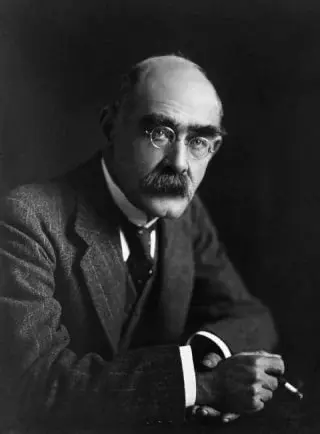Biography of Rudyard Kipling

| date | place | |
|---|---|---|
| born | December 30, 1865 | Bombay, British India |
| died | January 18, 1936 | London |
Rudyard Kipling, born in Bombay in 1865, was a prominent English short-story writer, poet, and novelist known for his celebration of British imperialism, particularly tales and poems set in India. His father, John Lockwood Kipling, influenced his work and was curator of the Lahore Museum. Kipling's childhood was marked by unhappy experiences, including time spent in a foster home in England. Returning to India in 1882, Kipling worked as a journalist, capturing the essence of native India in his writings. He gained rapid fame upon returning to England in 1889 with works like "Departmental Ditties" and "Plain Tales from the Hills." His reputation soared with the publication of "Barrack-Room Ballads" in 1892. Kipling's marriage to Caroline Balestier led to a move to the United States in 1892, but they returned to England in 1896. Kipling's notable works include "The Light That Failed," "Captains Courageous," and the classic "Kim." His famous novels "The Jungle Book" and "The Second Jungle Book" showcase his storytelling prowess. In 1902, he settled in Burwash, Sussex, and received the Nobel Prize for Literature in 1907. Kipling's imperialist convictions, influenced by his time in South Africa, where he associated with Cecil Rhodes, contributed to his isolation in later years. While Kipling's poems and stories were immensely popular in the late 19th and early 20th centuries, his reputation suffered post-World War I due to perceived jingoism. T.S. Eliot attempted rehabilitation. Kipling's prose, marked by developing art and exploration of deeper themes, contrasted with his declining critical reputation. Postcolonial critics later rekindled interest in his work, viewing it as both symptomatic and critical of imperialist attitudes. Kipling wrote successfully for children, with notable works like "The Jungle Book," "Puck of Pook's Hill," and "Rewards and Fairies." His miscellaneous works include travel sketches in "From Sea to Sea" and the posthumously published autobiography, "Something of Myself" (1941).
Feel free to be first to leave comment.